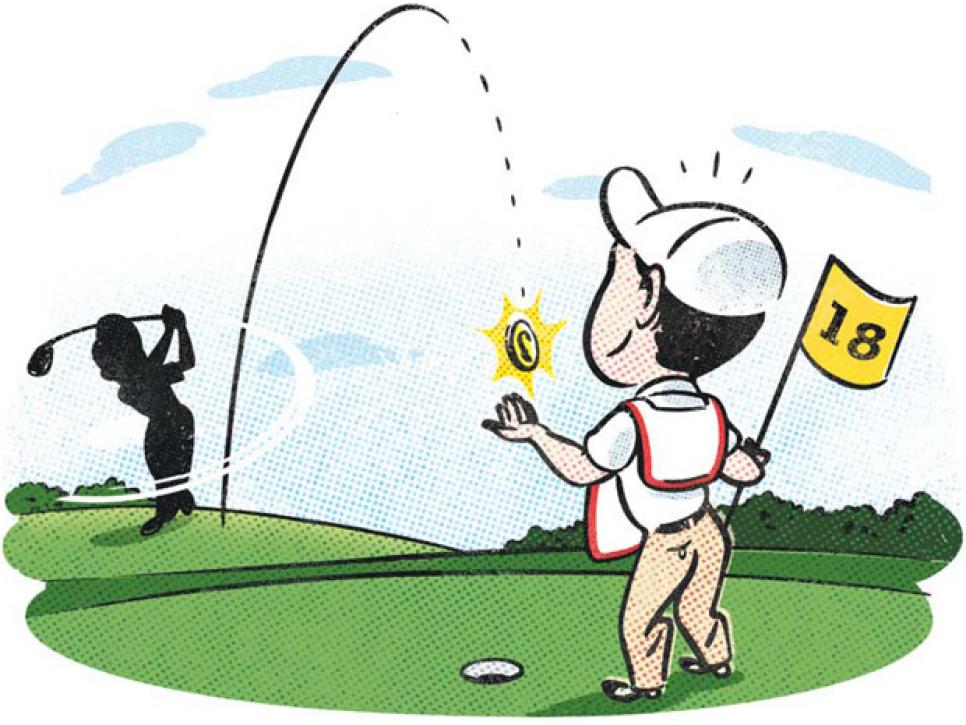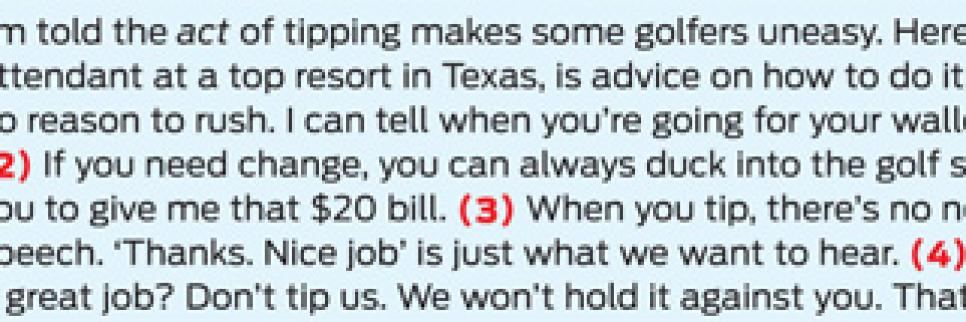The Tipping Point

We know tour pros make a ton of money, but are they generous tippers? Not usually, says Frolin Hatcher, a doorman for 42 years at Pinehurst Resort in North Carolina. Phil Mickelson
is an exception, "a great tipper" who distributed multiple $100 bills to staffers after his U.S. Open
appearances there, Hatcher says. Most players simply climbed into their courtesy cars and headed off down the road.
"I think they're used to having everything fed to them on a silver spoon, and they don't know you're supposed to tip," Hatcher says. "Or they just don't care."
Tipping can be tricky. Most would agree it's a bad move to stiff a guy like Hatcher, who greets guests and pulls clubs from their trunks, among other responsibilities. But how much should you tip him and other employees? When should you do it? And what, if anything, should you expect in return?
I spoke with people who depend on gratuities at a variety of private and public courses. Their message: A tip of any size is good. Bigger is better, naturally, but part of it is simple recognition; handing over some cash, even a small amount, you're saying, "Thanks."
"It's more than just financial," says Matt Boswell, a cart attendant at The Landing at Reynolds Plantation in Georgia. "A tip is an acknowledgement of our hard work, and we love that." (The financial element is pretty important, too: Cart attendants at Reynolds make $6.50 to $8.50 an hour. Over an eight-hour shift, their goal is an equal amount in tips.)
At most resorts, attendants pool their tips and split the pot. But not always. At Reynolds, Boswell says, they share tips only with the other staffers on duty at that time. If I tee off at 10 a.m. and wait till I'm done to tip the attendants, the morning guys will be long gone by the time I finish. I'll have unknowingly stiffed them.
Gratuities might be most important to caddies. Because the majority of them work as unsalaried "independent contractors," not employees, their compensation is basically 100 percent tip. If you ever wonder how much to pay, just ask in the golf shop before your round. At Oregon's Bandon Dunes resort, it's customary to pay caddies $80 to $100 per round, says Joe Bentham, a looper there for the past seven years. Sometimes big spenders will lay out more than that, but "caddies don't get too worked up about" the precise amount you tip, he says. "I'd rather have a guy who appreciates us and pays $90 than a guy who acts like a jerk and pays $140."
Bandon visitors who use the same caddie for multiple rounds will often tack on an extra gratuity at the end. Typical: an amount equal to one round's pay. (Bentham once caddied for Kurt Russell. Getting ready to leave, the actor peeled off an extra few bills: "This is for not mentioning the word 'movie' while I was here.") "It's not like we expect it," Bentham says of the final-round gratuity. "We also understand the economics of it: Bandon is an expensive trip. But caddies have egos, too. We like the encouragement."
At private clubs, caddie fees can be a matter of supply and demand. Loopers at one of the New York City area's top clubs typically get $70 to $75 a bag, its caddiemaster says. But the club's most sought-after caddies -- the ones who know the course and the game better than anyone -- often receive $100 a bag. It's also customary, though not required, to slide the caddiemaster $10 or $20 when you bring a group of guests. "It's like tipping the maitre d' for a good table at a restaurant," he says.
I have a friend who's strongly anti-tipping. (Not a tour pro, incidentally.) He argues that most of the time we're rewarding people for doing their job -- not for anything extraordinary. The thing is, being a miser isn't going to change the system any more than a $2 tip to a doorman is going to break a golfer's bank. And besides, what makes him so sure they aren't doing an extraordinary job? Does he think the range set itself up? That nobody had to get all those carts cleaned and charged and ready? That his golf bag got itself on the shuttle bus for a ride over to the proper course?
Hatcher, who goes out of his way to say how much he loves his job at Pinehurst, offers this observation: "A lot of people don't understand what we go through to make a living."
